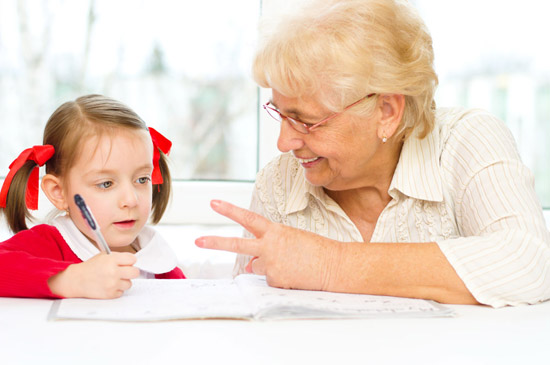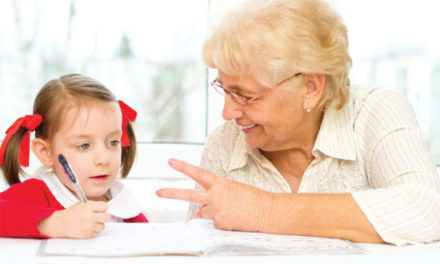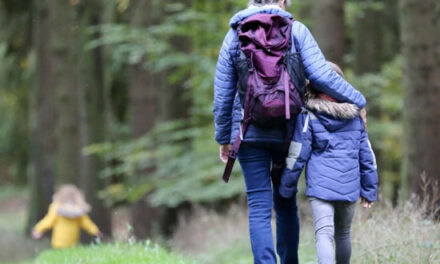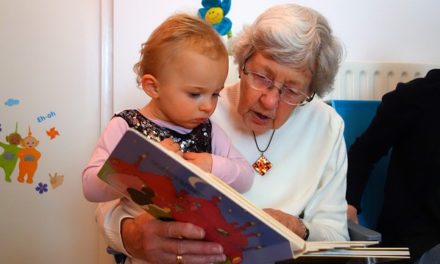As grandparents, we can play a unique roll in our grandchildren’s education. We may or may not be the place of overseeing homework and day-to-day decisions about education. But we can all provide a supportive hand for our grandchildren by assisting with homework, showing interest in school functions, and helping to broaden their learning.
REINFORCING SCHOOL LEARNING
Research shows that students learn best when adults around them reinforce what’s being taught. Whether or not you have expertise in any of their academic subjects, there are always opportunities to ask questions about what they are learning and help them make the connections to real-world applications. If you have the chance to help them with routine homework or a special project, that creates an opportunity to validate their role as students and also can create a special bond.
PARTICIPATION AT SCHOOL FUNCTIONS
There are many places to plug into activities at school functions. Attending sporting and drama events are obvious ways to be a part. But there may also be opportunities to volunteer to assist with special events such as field trips or class parties. And if a teacher knows about a special skill that you possess, there may be a chance to build a classroom learning experience around some area of your expertise.
BROADEN THEIR LEARNING
Educational opportunities go well beyond the classroom. You can share your enthusiasm for skills and hobbies that you enjoy. Maybe you like to tinker with cars, or bake, or garden, or smoke meats, or work on a craft with your hands. If you can share your excitement with them, they just may be interested in jumping into your hobbies.
Kids can be surprisingly curious about the world around them, especially when they pick up on your sense of adventure. Sometimes it’s easy to get into a rut of the day to day. Throughout the nation, there are thousands of National and State Parks, Local Museums, State & County Fairs, and cultural events. If you are willing to do a little checking, you should have no problem finding activities.
DO WHAT GOOD TEACHERS DO
Who were your favorite teachers during your youth? Why did you like them? Maybe they made their particular subject so interesting that you actually enjoyed their class. Maybe they worked extra hard at presenting the material in a way you could understand. Or, perhaps it had nothing to do with the actual teaching at all; maybe they always seemed to know just when you needed a word or two of encouragement.
We’d be wise to follow their example and utilize what we know about teaching and learning. First, we should find ways to engage our grandkids in what we’re teaching them. Instead of lecturing, we tell stories or use word pictures that appeal to them, or we plan “field trips” to expose them to new learning experiences. If we want them to remember what we teach them, we have to make it memorable.
Good teachers also know what appeals to their individual students. Likewise, we should learn and appeal to our kids’ learning styles. Cheri Fuller describes the three categories of learners: talkers and listeners, doers and touchers, and watchers. Each of our grandchildren demonstrate one or a combination of these strengths in their approach to learning. That’s why a grandparent shouldn’t expect a “doer and toucher” grandchild to sit still for very long during a lecture or an extended homework session. And that’s why auditory “talkers and listeners” learn better from tapes than from books.
But before we categorize our grandchildren too fast, it’s much more complicated than that. Your grandchild’s temperament comes into play: one grandchild will keep trying and trying until she can ride that bicycle; another will give up after one crash and wait a few months or years. And there are other factors: some kids like structure; some thrive with background music and indirect light; some do their best early in the morning; some need to bounce ideas off other students. The point is not that we should let their learning styles rule our lives to the point of disruption, but rather that most of us need to be more sensitive to this aspect of our grandkids’ education.
Third, if we want to teach our grandchildren effectively, we must become expert encouragers. Students inevitably fail; it’s part of their learning and development. We can help turn setbacks into positive, learning experiences—rather than embarrassments or failures—by being unwavering sources of confidence and support for our kids. They’ll begin to recognize and count on that support, the relationship will be strengthened, and they’ll be increasingly open to learn from their old man. What’s more, we may just inspire in our grandchildren a desire, possibly even a love, for learning. Perhaps there’s no higher goal in the task of educating our grandchildren.
BE A FAITHFUL MODEL
A strong relationship makes a grandchild’s “teachable” moments much more frequent, but by the same token, few things can close off a grandchild more quickly than a grandparent whose life doesn’t reflect what he or she teaches. It works in two ways: we need to be consistent, faithful models as teachers and as students.
Our grandkids notice everything about us—especially when we don’t want them to. When you tell your grandchild to be honest, realize that she’ll be watching how you handle the $50 bill you find in the parking lot. When you tell your grandson not to hold grudges against his classmates, that makes you accountable to do the same toward that irritable person at church or in the neighborhood. It’s amazing how quickly a few careless actions can undo years of well-chosen words, or how often adult grandchildren still remember their grandparents’ unfailing example more than their words.
Our responsibility as our grandchildren’s models doesn’t stop there; it includes being students (just when you thought you were through with your education). We demonstrate for our grandchildren that education truly is a way of life by continuing to learn, whether we’re taking university or community-offered classes, reading books that challenge us or learning a new craft. We become better prepared teachers, but our attitude of “always learning” also shows our grands that we don’t know everything after all.
Yes, you can be a big contributor to your grandchild’s education. There’s so much they don’t teach in school: lessons about morals, family relationships, faith, caring for themselves and their possessions, helping others-the list goes on and on. These are lessons that grandchildren need in life and, as their grandparent, you’re uniquely equipped to provide significant life-long lessons that you have picked up along the way.
ACTION POINTS
- Do you have friends (or friends-to-be) who are from another culture? Find an opportunity for your grandchildren to interact with them.
- Ask your grandchild what is the one thing you do that he or she would like to learn, and then teach it.
- Put an encouraging note in the textbook of your grandchild’s most challenging subject.
- Teach your older grandchildren a simple task related to home or car maintenance.
- Take your grandchildren to the library and give them thirty minutes to browse and check out some books.
- Many cities have museums and historic sites of different kinds. Research local opportunities and take advantage of nearby attractions.
- If you have the opportunity to take them on trips, mix up “educational” and “entertaining” activities.
- Listen to your young grandchildren recite their prayers; teach them a simple one.
- Ask your grandchild what he wants to be when he grows up, and then take him to visit a related work place.





